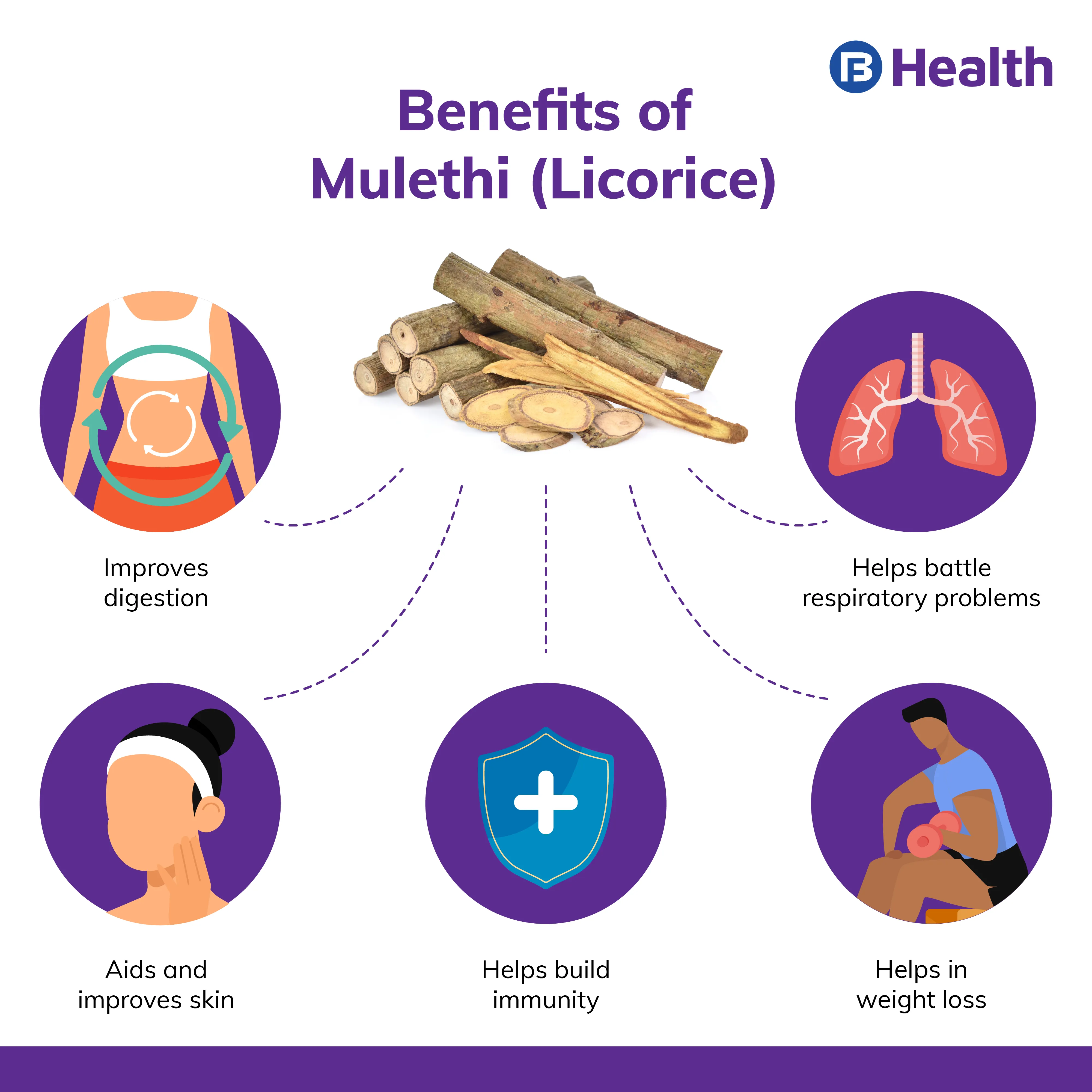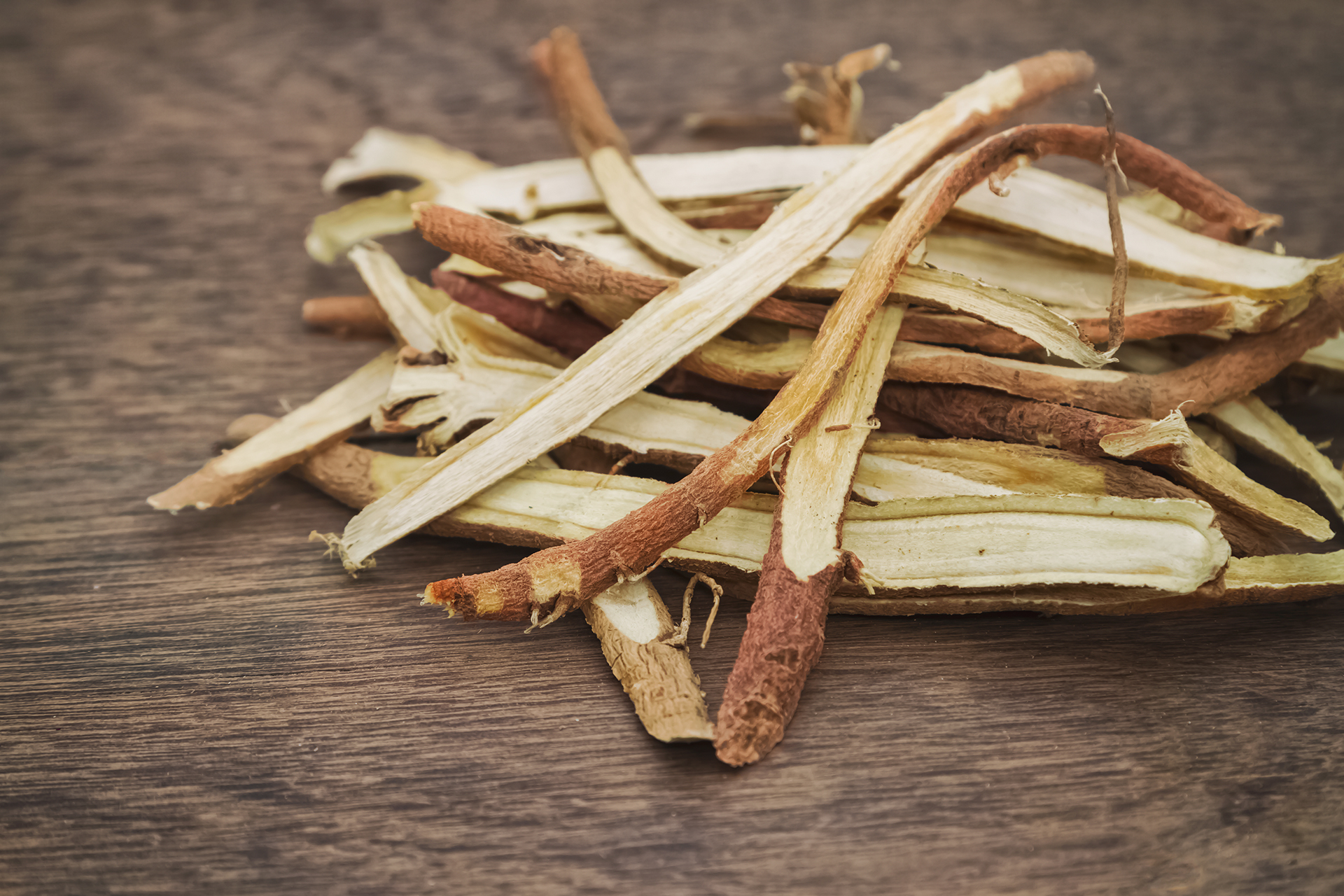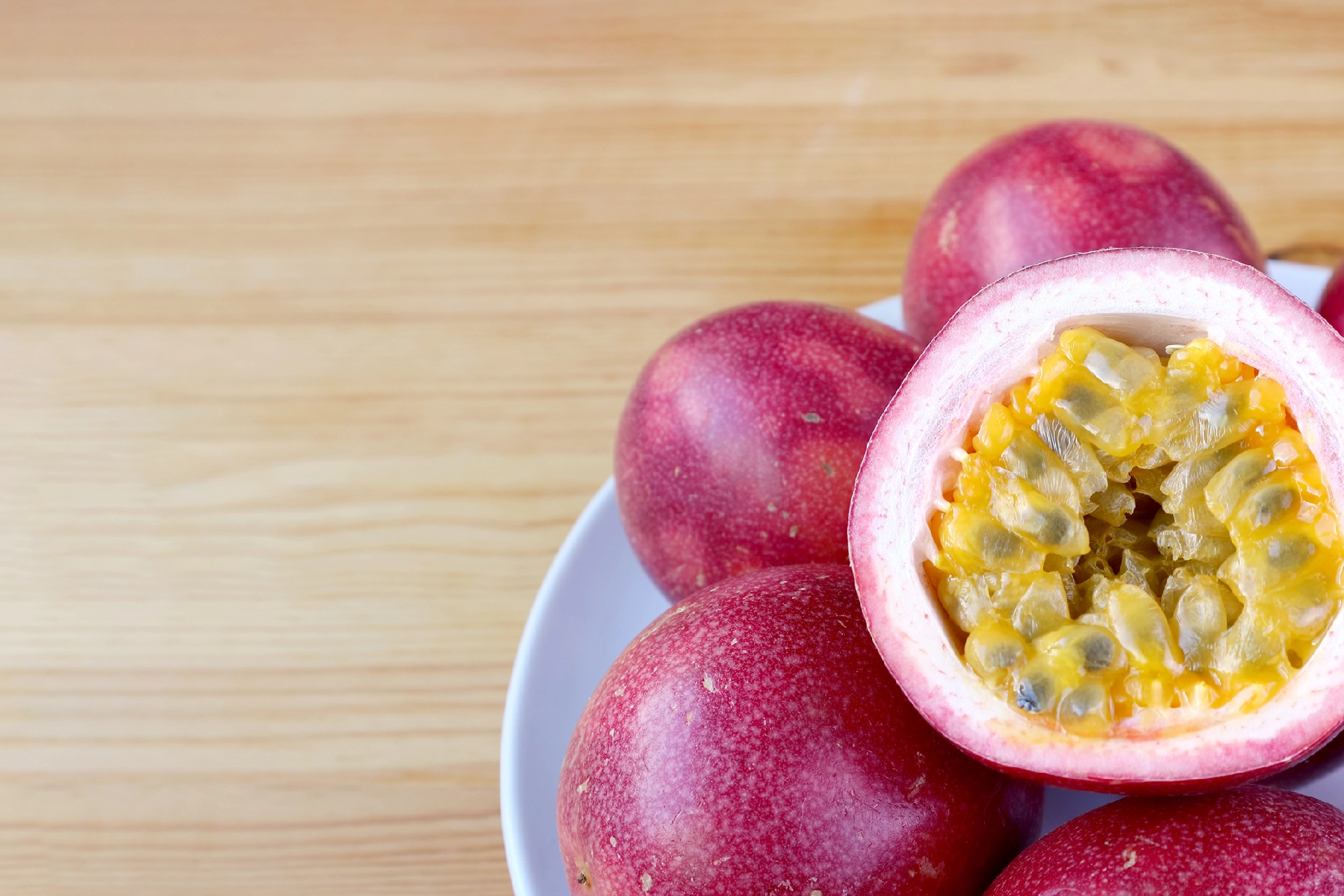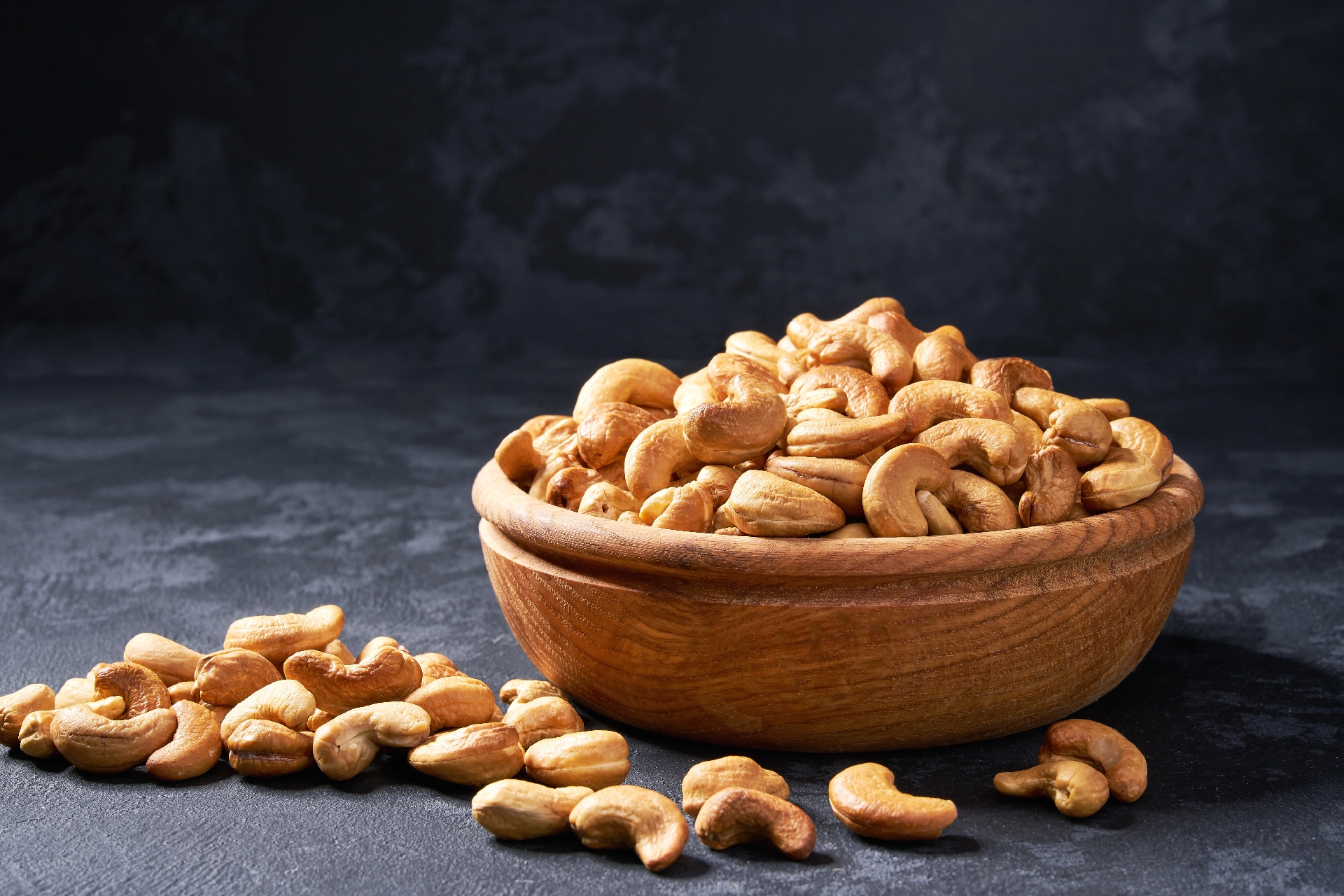Immunity | 10 min read
Mulethi Benefits For Skin, Uses, Side Effects and Risk
Medically reviewed by
Table of Content
Key Takeaways
- Mulethi benefits include treatment of eczema, acne and acid reflux
- Mulethi or licorice is native to West Asia and Southern Europe
- Consumption of mulethi powder benefits the immune system and digestive tract
Mulethi or licorice is one of the oldest herbal plants in India, known for its multiple multi-benefits. It is a sweet flower-bearing plant that is native to West Asia and Southern Europe. Mulethi's health benefits are well known and it is used to make several herbal formulations to treat various ailments and diseases.
The roots of mulethi are replete with more than 300 such flavonoids. This gives them anti-diabetic and antioxidant properties that can benefit and improve the health of your metabolic system. Furthermore, glycyrrhizin, a flavor compound that gives mulethi a sweet taste, is 30 to 40 times sweeter than sucrose, promoting multi uses to sweeten candies, confectionery, and beverages. Other multi-benefits include relief from digestion problems and stomach-related conditions due to its antiseptic properties. Mulethi's health benefits also include treating cough and cold, reducing sugar cravings, and controlling sugar and blood pressure levels.
Read on to know more about the different ways you can consume mulethi and the various benefits of mulethi you should know of, especially those concerning immunity.
Mulethi Nutritional Value
Anethole, which makes up about 3% of the total plant, is one of a variety of complex chemicals that give Mulethi its alluring aroma. A molecule called glycyrrhizin, typically 50 times sweeter than sugar, accounts for most of the sweetness in food. The roots of licorice include the isoflavone glabridin. [1]
Mulethi Benefits
Treats Canker Sores
Mulethi's mucosa healing and anti-inflammatory effects also help it treat canker sores. Studies show that Mulethi has some efficacy in treating the herpes virus. Our immune system may be strengthened, and the virus in our bodies can be readily fought by chewing the Mulethi plant. [2]
Safeguards Liver
Mulethi aids in the treatment of a number of conditions, including hepatitis, non-alcoholic fatty liver disease, liver damage, and jaundice. It also contains anti-inflammatory qualities that aid in soothing the liver during hepatitis. In addition, Mulethi can cleanse the liver and strengthen its resistance to illness when combined with warm tea twice a day.
Enhances Dental Wellness
Mulethi's anti-microbial and anti-bacterial characteristics can help slow the development of bacteria that causes cavities, fight foul breath, lessen plaque, and maintains the strength and health of the gums and teeth. We can clean our teeth with dried Mulethi powder and maintain good oral health by using mouthwash that contains Mulethi.
Enhancing Memory
Consuming Mulethi roots can have a supporting impact on the adrenal gland, which helps to stimulate the brain. It not only enhances learning but also lessens amnesia's effects. However, when prescribed by a physician, Mulethi should only be taken for memory enhancement.
Helpful for Hormonal Imbalance
The phytoestrogen components found in Mulethi roots are helpful for women experiencing mood swings, tiredness, hot flashes, menopausal symptoms, and hormonal imbalance issues. Additionally, it eases menstrual cramps and controls the flow of the period. This is brought on by Mulethi's production of cortisol, which has an impact on the brain.
Consumption of mulethi in any of the above forms has the following mulethi benefits.
Improves Digestion
Consumption of mulethi or jethimadh benefits the digestive tract, reducing bloating and flatulence. Mulethi's anti-fluctuance property hinders the formation of gas in the digestive tract. Furthermore, mulethi churna benefits include reduction in indigestion and increased appetite. Mulethi increases the amount of nutrients your body absorbs from foods. Also, the high fibre content in the root makes it a potent remedy for constipation. Research also indicates that flavonoids such as glabrene and glabridin present in mulethi roots can help alleviate stomach discomfort, reducing stomach pain, heartburn and nausea.
Aids and Improves Skin
Mulethi has more than 300 compounds that are replete with anti-fungal, anti-viral and anti-bacterial effects. This makes mulethi a potent remedy for various skin conditions, including eczema and acne. Studies show that applying a topical cream that contains extract of mulethi roots significantly improves eczema in adults. Furthermore, consumption or application of mulethi helps improve and prevent skin conditions such as psoriasis, dry skin, rashes, acne, and inflammation.
Helps Battle Respiratory Problems
Considering mulethi has powerful antibiotic, anti-asthmatic and anti-inflammatory properties, it is a potent remedy for cough, common cold and flu. Consumption of mulethi decongests the chest and nasal cavities, as it thins mucus and phlegm deposits, helping in easy breathing. Other benefits of mulethi include improving lung tissue and lung health, which help in battling and managing respiratory conditions such as asthma and bronchitis.
Helps in Weight Loss
Other crucial mulethi powder benefits include weight loss. Mulethi powder is packed with flavonoids and fibre-heavy nutrients that suppress hunger, stopping you from overeating, helping you lose weight. Furthermore, jeshthamadh powder uses include daily consumption to reduce LDL or bad cholesterol levels, which improves metabolism, resulting in faster weight loss. This not only helps you lose weight faster, but also improves overall digestive health. Apart from these, mulethi helps treat acid reflux, peptic ulcers, cavities, helps in reducing menopause symptoms, helps manage diabetes symptoms, aids in the treatment of hep C and ulcers.
Helps Build Immunity
Of the multiple components of our immune system, there are two types of cells, macrophages and lymphocytes, which get a boost when you consume mulethi. This is due to the enzymes present in this root, which help protect your body from a range of allergens, microbes and pollutants. These usually cause autoimmune diseases and mulethi is considered to work against them. Further, it is credited with boosting your energy and stamina, and helps in reducing stress by improving the function of kidney, liver and adrenal glands. All this together helps shield your body against a myriad infections.

Different Uses of Mulethi
Mulethi can be used in different forms, such as a powder, a drink, and even tea. Here are ways to prepare mulethi for use.
1. Mulethi Powder
Cut the roots of fresh mulethi plants and wash them using water to rid them of impurities and soil. Now, cut the roots into small pieces and let them dry in the sun for a week or so until they have no moisture left. Once they are completely dry, grind the root pieces in a grinder until it forms a fine powder. Once done, strain the powder through a sieve to remove any impurities. Air-dry the powder to remove any remaining moisture. Lastly, store the powder in a dry and air-tight container. Mulethi powder uses include being an ingredient in multiple Ayurveda formulations that help fight and prevent skin and digestive tract ailments. Furthermore, consumption of mulethi powder benefits the immune system, boosting its prowess and improving your overall health.
2. Mulethi Tea
To make mulethi tea, add a small piece of licorice root to water and grated ginger, and let it simmer for 5 mins. Then add tea leaves or a teabag and let it further simmer for more than five minutes. This allows the tea to absorb all flavours and nutrients from the root. You can choose to add milk and sugar or strain and consume the concoction as is. Mulethi tea benefits include detoxification and weight loss.
3. Mulethi Water
Soak a couple of small pieces of mulethi in a glass of water overnight and consume it first thing in the morning. This aids digestion and also helps in improving skin health. Furthermore, you can also choose to warm the water and add a little lemon juice for taste.
4. Mulethi Syrup
To make mulethi syrup, boil mulethi, ginger, black peppercorns and cardamom in water. Then add honey to the mixture and store the syrup in a glass container. Add a teaspoon of the syrup to a glass of warm water and use mulethi to treat cold, sore throat or cough. This is an effective natural and homemade remedy for cough, cold and sore throat.
5. Mulethi Sticks
One of the simplest ways to clear congestion and eliminate bad breath is chewing on the tip of a clean mulethi root stick.
Mulethi Benefits for Cancer
In lab investigations, the possible role of liquorice in several malignancies has been noted. However, additional study is necessary to support the use of liquorice against human cancer. You are thus encouraged to follow the doctor's recommendations and medical care closely. [3]
Mulethi Benefits for Cervical Cancer
The most common malignancy among women is cervical cancer. Licorice contains a flavonoid component called isoliquiritigenin (ISL). ISL treatment increased apoptosis and slowed the development of cancer cells in cell line tests (cell death). ISL's anticancer properties can therefore be employed.
Mulethi Benefits for Breast cancer
This cancer is one of the main causes of mortality for women worldwide. During a study, ISL could prevent the emergence of breast cancer. ISL boosted the death of cancer cells and blocked the activity of the protein's vascular endothelial growth factor receptor two and vascular endothelial growth factor in cancer cells. ISL may thus help treat breast cancer. [4]
Mulethi Benefits for Liver Cancer (in adults)
ISL has demonstrated several antitumor advantages in adult liver cancer. An animal model shows the advantages of chemoprotection. Additionally, liver cancer risk was decreased. The oxidative stress brought on the cancer cells was lessened because of ISL's antioxidant action. Furthermore, it halted the expansion of cancer cells. ISL could be useful in treating liver cancer.
Mulethi Benefits for Stomach Cancer
In an animal study, liquorice extract administration significantly slowed the growth of tumours in colon cancer cells. Liquorice extract may be utilized as a chemoprotective agent to treat colon cancer. ISL has demonstrated potential for application in colon cancer.
Precautions to Take Mulethi
Here are some precautions you should always follow when using liquorice:
- Monitoring electrolytes and blood pressure when consuming liquorice are advised. It's also advised to consume more potassium in your diet
- In individuals with a history of hypertension or renal failure, those who are already using digitalis preparations, liquorice should be avoided
- When consuming liquorice, anyone using insulin or any other oral hypoglycaemic medication should keep a watchful eye on their blood glucose levels
- Due to a lack of information on its safety for pregnant and lactating mothers, liquorice consumption should be avoided
It would be best if you also spoke with your doctor about any potential side effects before using liquorice for any medical problem.
Side Effects and Risks of Mulethi
- Mulethi is generally regarded as a safe plant and may be taken for a brief period in tiny doses without experiencing any adverse effects
- However, prolonged use and overdose can lead to health complications. If you have any existing conditions, you should consult your doctor about liquorice consumption
- Glycyrrhizin can build up in the body due to chronic and heavy Mulethi use. This causes an increase in the amount of cortisol in the body, which in turn causes fluid and electrolyte level imbalances
- Furthermore, chronic consumption of Mulethi can cause muscle weakness, a decrease in potassium levels, abnormal heart rhythms, and high blood pressure
- Furthermore, Mulethi interacts with blood thinners, diuretics, blood pressure, a cholesterol-lowering medication, and estrogen-based contraceptives
- Eat Mulethi only under the guidance of your doctor
- Over a thousand years have passed since Mulethi was first used to heal illnesses. There is substantial evidence to support its efficacy in the treatment and prevention of respiratory, digestive, and skin diseases
- Mulethi also has negative side effects when used excessively. The best course of action is to speak with your doctor before using Mulethi powder or pills
Conclusion
Mulethi, in general, is considered a safe herb and can be consumed in small quantities for a short time without any adverse effects. However, prolonged use and overdose can lead to health complications. If you have underlying conditions, you should consult your doctor about licorice consumption.
Chronic and large consumption of mulethi can result in the accumulation of glycyrrhizin in the body. This causes an increase in the amount of cortisol in the body, which in turn causes fluid and electrolyte level imbalance. Furthermore, chronic consumption of mulethi can cause muscle weakness, a decrease in potassium level, abnormal heart rhythms and high blood pressure. Furthermore, mulethi interacts with blood thinners, diuretics, blood pressure and cholesterol-lowering medication and estrogen-based contraceptives. If you are taking any of these medications, consume mulethi under your doctor's supervision.
Mulethi has been used to treat ailments for more than a thousand years. There is enough research that shows its effectiveness in treating and preventing skin ailments, digestive issues, and respiratory conditions. However, overuse of mulethi has adverse side effects as well. Therefore, it is best to consult your doctor before trying mulethi powder or supplements.
To get the apt medical advice at the right time, use Bajaj Finserv Health. It not only helps you search for the best specialist in your area, but also allows you to book instant appointments. Whether you want an in-clinic or video consultation, do it right from the app and even get handy health reminders and medical resources. Get a range of discounts and deals from health clinics, pharmacies and labs so you can address your health proactively.
References
- https://www.sciencedirect.com/science/article/pii/S2211383515000799
- https://www.ncbi.nlm.nih.gov/pmc/articles/PMC3123991/
- https://pubmed.ncbi.nlm.nih.gov/14522625/,
Disclaimer
Please note that this article is solely meant for informational purposes and Bajaj Finserv Health Limited (“BFHL”) does not shoulder any responsibility of the views/advice/information expressed/given by the writer/reviewer/originator. This article should not be considered as a substitute for any medical advice, diagnosis or treatment. Always consult with your trusted physician/qualified healthcare professional to evaluate your medical condition. The above article has been reviewed by a qualified doctor and BFHL is not responsible for any damages for any information or services provided by any third party.





